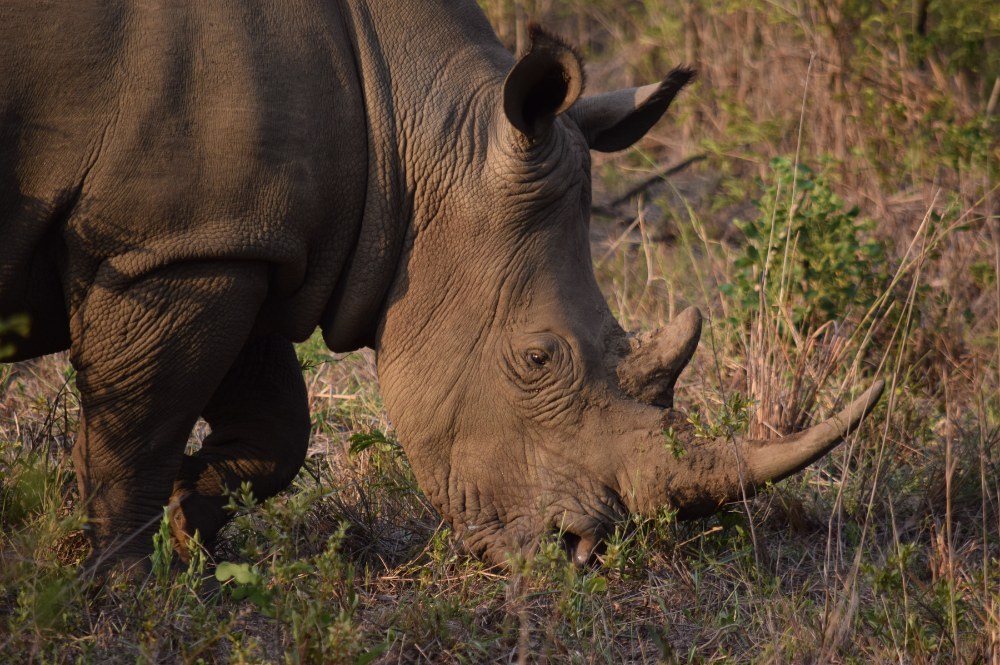In a significant development for rhino conservation, six individuals have been arrested on suspicion of international trafficking of more than 960 rhino horns. John Hume, previously the breeder and owner of the world’s largest captive rhino operation, and his lawyer, Isak du Toit, have been confirmed as two of the individuals involved.
Cathy Dean, MBE, Grants Lead at Save the Rhino said, “These arrests mark a critical juncture in tackling the organised crime networks driving illegal rhino horn trade and highlight the challenges in regulating horn trade. Every horn trafficked represents not only a threat to rhinos and the ecosystems they call home, but also fuels wider organised crime, exploiting people and communities throughout the chain of criminal activity.”
The arrests come eight years after Mr Hume took the South African government to the Constitutional Court to allow domestic trade in rhino horn and build upon a seven-year investigation by the South African Police Service’s Department for Priority Crime Investigation’s (also known as the Hawks) Wildlife Trafficking Section. Authorities have alleged that the syndicate used a web of fraudulent permit schemes, exploiting South Africa’s domestic trading regulations under the National Environmental Management: Biodiversity Act (NEMBA) to mask horn exports destined for Southeast Asia, despite international bans under CITES (the Convention on International Trade in Endangered Species of Fauna and Flora).
“We commend the commitment shown by South Africa’s enforcement agencies and their partners to this case. These arrests send a clear signal that rhino horn trafficking and associated serious organised crimes will be investigated thoroughly and prosecuted to the full extent of the law. Disrupting transnational organised crime is essential to stopping poaching, allowing populations to recover and ensuring rhinos have a future in the wild” added Dr Jo Shaw, CEO at Save the Rhino.
The six suspects, reported to be John Hume, Clive Melville, Izak du Toit, Catherina van Niekerk, Matheus Poggenpoel and Johannes Hennop, have been charged with fraud, theft, and contravention of NEMBA. Prosecutors are also reviewing additional serious charges including racketeering and money laundering. One suspect, Clive Melville, who is the half-brother of John Hume’s cousin, was previously arrested in 2019 in one of the largest rhino horn seizures in South Africa’s history, when he was charged with illegally transporting 167 rhino horns on Hume’s behalf. All six suspects are reported to have voluntarily surrendered to the Hawks and appeared before the Pretoria Magistrates’ Court on Tuesday 19th August 2025.
South Africa’s Minister of Forestry, Fisheries and the Environment, Dr Dion George, commented, “The Hawks’ work shows that our enforcement agencies will not hesitate to pursue those who plunder our wildlife for criminal profit. This arrest proves that syndicates cannot escape justice, no matter how complex their schemes.”
Cases like this put a spotlight on the serious, organised networks making a profit from wildlife crime. Rhino populations across Africa continue to be under huge threat from poaching, with 516 rhinos poached on the continent in 2024.
A Brief History of John Hume and Rhinos
To understand the context of these arrests, it’s important to reflect on John Hume’s long and often controversial history with rhino breeding and horn trade.
Early 2000s: John Hume began his rhino breeding project, with approximately 200 Southern white rhinos on a ranch, then known as Buffalo Dream Ranch, in Gauteng.
2009: The South African Government introduced a moratorium (ban) on domestic trade in rhino horn. John Hume and Johan Kruger (another private rhino owner) challenged the moratorium through the courts during subsequent years.
April 2017: South Africa’s Constitutional Court reversed the ban, ruling that there had been inadequate prior consultation. From this point onwards, anyone with a permit to sell rhino horn within South Africa has been legally able to do so, provided the buyer has an equivalent permit.
August 2017: Hume held an online auction to sell 264 rhino horns. Widely publicized, the website contained translations into Mandarin and Vietnamese. Although the details of the auction – the number of lots sold and prices fetched – were never made public, Hume stated he was “disappointed” with the sale, blaming the South African Government and adverse publicity for the lack of interest. Hume’s lawyer, Izak Du Toit, wrote in a statement: “The auction yielded fewer sales and fewer bidders than anticipated, but the legal domestic trade has now been established and the road has been paved for future sales.”
August 2017: Ahead of the online auction, it was widely reported that Hume required funding from the rhino horn sales to continue his Captive Breeding Operation (CBO), with approximately 1,600 rhinos needing significant security.
June 2018: Hume released a statement in search of a ‘wealthy partner’ to invest in the CBO and secure sustainable funding for the future.
May 2019: Clive Melville and Petrus Stephanus Steyn were arrested in one of the largest rhino horn seizures in South African history. The pair were caught transporting 167 rhino horns illegally. Melville and Steyn stated they were transporting the horns on behalf of Hume to another location in Gauteng, but lacked the necessary permits for their travel through North West Province. The pair entered into a plea agreement and were sentenced in June 2020.
September 2023: International NGO African Parks took ownership of John Hume’s ranch, which had been renamed ‘Platinum Rhino’ and the estimated 2,000 rhinos within it, planning to rewild the rhinos over the following decade. African Parks did not buy Hume’s rhino horn stockpile; it is not known whether John Hume retained ownership of this, or whether he sold them separately to another buyer / other buyers.
Save the Rhino International will continue to monitor these developments closely and work with partners worldwide to ensure that rhino conservation efforts are safeguarded from the pressures of organised crime.








